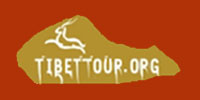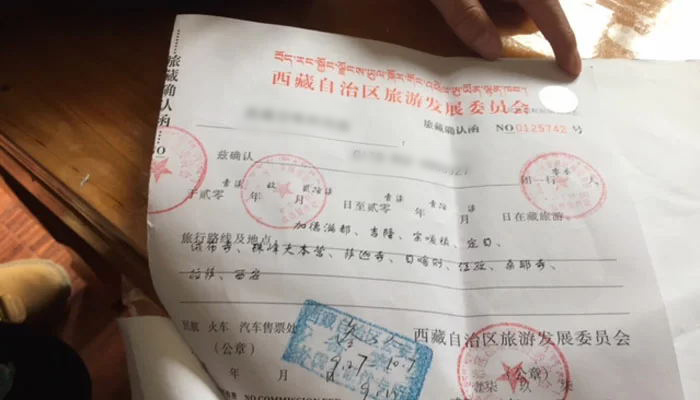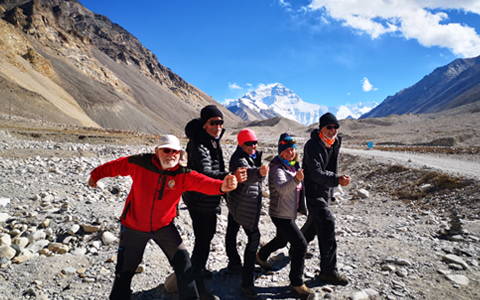In Tibet, we speak Tibetan language, and many of us can also speak Mandarin. Generally, English and Mandarin are sufficient for basic communication during your Tibet tour, but learning some Tibetan words can make your experiences more enriching. This not only shows your respect for the local culture, but also helps you to connect with local Tibetans.
In this guide, we have collected useful Tibetan words that you will likely use in various situations. Check this guide to prepare yourself for greetings, directions, dining, shopping, accommodations, emergencies, and more. With these phrases in hand, your journey in Tibet will be smoother and more fulfilling.
Why Learn A Few Tibetan Words and Phrases?
Tibetan language and Chinese Mandarin are the two main languages of Tibet. In urban areas, almost all Tibetans are fluent in both languages, while Tibetan dialects are more commonly spoken at remote villages in Tibet.
Even if you have studied some Chinese in mainland China, it’s worth trying to learn a few Tibetan words. Your effort will earn smiles and gratitude from the locals, helping to break the ice and create more opportunities for meaningful interactions.
Although your pronunciation might not be perfect, your genuine attempt will be appreciated. Additionally, knowing basic Tibetan phrases can be helpful in unfamiliar situations, like shopping or handling emergencies in remote areas of Tibet.
 One of our clients is interacting with a local Tibetan in Barkhor Street.
One of our clients is interacting with a local Tibetan in Barkhor Street.Common Tibetan Words for Greetings and Daily Conversations
“Tashi Delek” must be the first Tibetan phrase you will hear in Tibet. It means hello, good luck, or may many good things come to you. It’s a common greeting in Tibetan daily life.
You will hear it when you meet our Tibetan guide upon arrival at the airport or railway station. You may also hear it while enjoying your meals or making friends with Tibetans. Here are some other common Tibetan phrases for daily conversations:
| English | Tibetan Language | Mandarin |
|---|
| Hello |
tashi dele |
nin hao |
| Goodbye (when staying) |
kalee pay |
zai jian |
| Goodbye (when leaving) |
kalee shu |
zai jian |
| Thank you. |
tujay chay |
xie xie |
| You are welcome. |
Kay - nang - gi ma - ray |
Bu yong xie |
| Sorry. |
gonda |
dui bu qi |
| I want… |
nga la…go |
wo xiang… |
| Good |
yag-po |
hao de |
| Nice to meet you. |
Khye ran jel - ne ga-po joong. |
hen gao xing ren shi ni |
| See you later. |
Jay - la jay - yong |
dai huier jian |
| What's your name? |
kerang gi tsenla kare ray? |
nin jiao shenme mingzi |
| My name is… - and yours? |
ngai ming-la…sa, a- ni kerang-gi tsenla kare ray? |
wo jiao…-nin ne? |
| Where are you from? |
Keh rahng long - ba kah - nay yin |
ni lai zi na li |
| I am from.. |
Ngah... nay yin |
wo lai zi... |
| Is it OK to take a photo? |
par gyabna digiy-rebay? |
zheli keyi paizhao ma? |
These simple phrases are enough to spark warm exchanges with locals, especially in monasteries, markets, or while trekking through villages.
Join our most popular Everest Base Camp tour for a smooth travel experience.
Useful Tibetan Words for Directions and Getting Around
When touring Tibet, you will always be accompanied by our local tour guide and drivers as you visit various attractions and travel from one place to another. This ensures that you will not get lost while exploring Tibet.
But after the tour, you may also choose to stroll around near your hotel on your own. In this situation, you might find it useful to know some basic words for directions. Here are some helpful phrases to help you get from point A to point B:
| English | Tibetan Language | Mandarin |
|---|
| Where is the ...? |
... kabah yo ray? |
…zai nar? |
| I'm looking for ... |
... ka-bah yo-may mik tagiyo |
wo zai zhao… |
| Right |
yeba |
you bian |
| Left |
yonba |
zuo bian |
| Straight ahead |
shar gya |
zhi zou |
| Stop |
Ka kak |
ting zhi |
| Nearby |
Dram-La or |
Fu jin |
Useful Tibetan Words for Dining and Shopping Like a Local
Dining and shopping in Tibet are wonderful ways to immerse yourself in the local culture. Whether you are savoring a bowl of Tibetan noodles at a traditional Tibetan restaurant, or browsing handmade Tibetan crafts on Barkhor Street, these simple phrases will come in handy:
| English | Tibetan Language | Mandarin |
|---|
| I'd like to buy ... |
nga ... nyondo yo |
wo xiang mai… |
| How much is it? |
gong katso ray? |
duo shao qian? |
| It's expensive. |
gong chenpo resha |
tai gui le. |
| I don't like it. |
loh doh masong |
wo bu xi huan. |
| I'll take it. |
te nyogi yin |
wo jiu maizhei ge. |
| Restaurant |
Sa-khang |
fan dian |
| May I have the menu? |
Tsel-Dep Nang Rok Nang |
Wo ke yi kan xia cai dan ma? |
| I want some tea. |
Nga la cha go |
wo xiang he cha. |
| Water |
Chu |
shui |
| Tea |
Cha |
cha |
| Meat |
Sha |
rou |
| Cafe |
Ja-Kang |
Ka fei |
| Delicious |
Delek nang |
mei wei |
| One more please |
Yang Kyar Chik |
Zai lai yi fen |
 It's helpful to learn some Tibetan words for dinning situation in Tibet.
It's helpful to learn some Tibetan words for dinning situation in Tibet.Useful Tibetan Words for Accommodations
You will have a wide range of choices when staying in Tibet, from Lhasa’s luxury five-star hotels to budget guesthouses, and from traditional Tibetan hotels to warm tents at EBC. Here are some key terms that can make your stay more comfortable in Tibet:
| English | Tibetan Language | Mandarin |
|---|
| Where's a...? |
...kabah yoray? |
...zai nar? |
| Guesthouse |
dhon khang |
zhao dai suo |
| Hotel |
dru-khang |
bin guan/jiu dian |
| Do you have a room available? |
khang mi yobay? |
nimen you fangjian ma? |
| How much is it for one night? |
tsen chik la katso ray? |
duo shao qian yi wan? |
| I need some hot water. |
ngala chu tsapo go |
wo xu yao xie re shui |
Our Tibet Everest Base Camp tour offers suitable hotels for a comfortable experience.
Useful Tibetan Words for Emergencies and Health Needs
Tibet is a very safe place to visit. Tibetan people here are friendly and welcoming to tourists. Since you will join a tour when traveling in Tibet, your safety will always be ensured with the accompany of our thoughtful local guide.
However, it is wise to be prepared for unexpected situations. In case of any emergency, these phrases can help you communicate your needs if you are feeling unwell or require assistance.
| English | Tibetan Language | Mandarin |
|---|
| Help! |
rog nangda! |
jiu ming a! |
| Fire! |
may bahgi! |
qi huo la! |
| Thief! |
kuma du! |
zhua xiao tou! |
| Go away! |
phah gyuk! |
zou kai! |
| I'm ill. |
nga nagidu |
wo bing le. |
| It's an emergency. |
za dagpo ray! |
jin ji qing kuang! |
| Call a doctor! |
amchi kay tongda! |
qing jiao yisheng! |
| Call the police! |
korsoong-wa kay tongda! |
qing jiao jingcha! |
Useful Tibetan Numbers and Dates for Smooth Tibet Travel
Numbers are used in various situations, from getting prices for things to understanding distances. Here are the Tibetan numbers commonly used in daily life:
| English | Tibetan Language | Mandarin |
|---|
| 0 |
Chik |
yi |
| 1 |
kalee pay |
zai jian |
| 2 |
Nyi |
er |
| 3 |
Sum |
san |
| 4 |
Shi |
si |
| 5 |
Ngah |
wu |
| 6 |
Trook |
liu |
| 7 |
Dun |
qi |
| 8 |
Geh |
ba |
| 9 |
Gu |
jiu |
| 10 |
Chu |
shi |
| 11 |
Chu Chik |
shi yi |
| 12 |
Chu nyi |
shi er |
| 20 |
Nyi Shu |
Er shi |
| 30 |
Sum Chu |
San shi |
| 40 |
Sheep Chu |
Si shi |
| 50 |
Ngap Chu |
Wu shi |
| 60 |
Trook Chu |
Liu shi |
| 70 |
Dun Chu |
Qi shi |
| 80 |
Geh chu |
Ba shi |
| 90 |
Gup chu go |
Jiu shi |
| 100 |
Gyah tamba |
Yi bai |
| 1000 |
Chik tong |
Yi qian |
Knowing the dates can also help you manage your itinerary and make the most of your time in Tibet. Here are the days of the week in the Tibetan language for your reference:
| English | Tibetan Language | Mandarin |
|---|
| Sunday |
Sah nyi - ma |
Xing qi tian |
| Monday |
Sah da -wah |
Xing qi yi |
| Tuesday |
Sah-mik-mar |
Xing qi er |
| Wednesday |
Sah Lhak - pa |
Xing qi san |
| Thursday |
Sah phur - bu |
Xing qi si |
| Friday |
Sah - pah - sahng |
Xing qi wu |
| Saturday |
Sah pem - pa |
Xing qi liu |
| Today |
Thi - ring |
Jin ti |
| Tomorrow |
Sahng - nyi |
Ming tian |
| Last week |
Dun - tha Nyema |
Shang zhou |
| Next week |
Dun - tha Jeyma |
Xia zhou |
Enjoy a worry-free journey with our experienced local guides on our tour.
Conclusion
Learning a few Tibetan words and phrases can greatly enhance your travel experience. It will help you build meaningful connections with locals, and gain a deeper understanding of Tibetan culture. However, even if you know little about Tibetan language, you can still enjoy a smooth and memorable journey in Tibet.
As the leading Tibet tour with years of experience, we will always ensure you have a worry-free and seamless adventure. Our local Tibetan guide and dedicated Lhasa-based team provide full support throughout your trip. Feel free to contact us or book your tour with us now!

























 One of our clients is interacting with a local Tibetan in Barkhor Street.
One of our clients is interacting with a local Tibetan in Barkhor Street.
 It's helpful to learn some Tibetan words for dinning situation in Tibet.
It's helpful to learn some Tibetan words for dinning situation in Tibet.









Ask a Quick Question